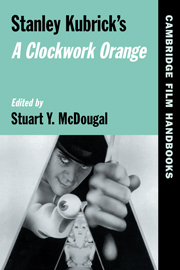Book contents
- Frontmatter
- Contents
- Acknowledgments
- List of Contributors
- Introduction: “What's it going to be then, eh?”: Questioning Kubrick's Clockwork
- 1 A Clockwork Orange … Ticking
- 2 The Cultural Productions of A Clockwork Orange
- 3 An Erotics of Violence: Masculinity and (Homo)Sexuality in Stanley Kubrick's A Clockwork Orange
- 4 Stanley Kubrick and the Art Cinema
- 5 “A Bird of Like Rarest Spun Heavenmetal”: Music in A Clockwork Orange
- REVIEWS OF A CLOCKWORK ORANGE, 1972
- A Glossary of Nadsat
- Filmography
- Select Bibliography
- Index
- References
3 - An Erotics of Violence: Masculinity and (Homo)Sexuality in Stanley Kubrick's A Clockwork Orange
Published online by Cambridge University Press: 29 January 2010
- Frontmatter
- Contents
- Acknowledgments
- List of Contributors
- Introduction: “What's it going to be then, eh?”: Questioning Kubrick's Clockwork
- 1 A Clockwork Orange … Ticking
- 2 The Cultural Productions of A Clockwork Orange
- 3 An Erotics of Violence: Masculinity and (Homo)Sexuality in Stanley Kubrick's A Clockwork Orange
- 4 Stanley Kubrick and the Art Cinema
- 5 “A Bird of Like Rarest Spun Heavenmetal”: Music in A Clockwork Orange
- REVIEWS OF A CLOCKWORK ORANGE, 1972
- A Glossary of Nadsat
- Filmography
- Select Bibliography
- Index
- References
Summary
A symptomatic silence over gender and sexuality haunts analyses of Stanley Kubrick's 1971 film, A Clockwork Orange. Criticism of the film has tended to focus on three general areas – philosophical questions and concepts (i.e., free will and humanism), the film's representation of violence, and Kubrick as film auteur. These analyses frequently treat gender and sexuality superficially or ignore them entirely. In order to articulate its visual and thematic concerns, however, the film both supports and parodies the stability of (hetero)sexual difference. Because of this tension in representation, I want to consider the construction of gender and sexuality in the film and specifically explore the film's construction of masculinity.
Before beginning my analysis, I want to summarize briefly the three general areas of criticism mentioned above. First, the film's philosophical arguments on free will situate Alex's violent anarchism against the government and the Ludovico scientists' fascist attempts to control and contain him. Because the only sympathetic character is Alex, the film mobilizes support for anarchism over fascism by portraying the other characters as caricatures. Throughout the film, their hypocrisy undermines their credibility, leaving Alex in a position of relative moral and narrative authority.
This thematic and philosophical irony of the film has been a common area of exploration for several critics. While Clockwork explores these issues, however, it also casts a critical gaze on the antihero, Alex. Thomas Allen Nelson, for example, does not characterize Alex's actions and subjectivity as ironic, but rather as straightforward and refreshingly normal.
- Type
- Chapter
- Information
- Stanley Kubrick's A Clockwork Orange , pp. 61 - 84Publisher: Cambridge University PressPrint publication year: 2003
References
- 2
- Cited by



